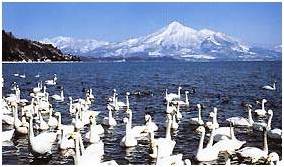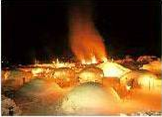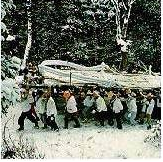JET in Fukushima
Seasons in Fukushima: Winter
|
Scenery
Around late autumn, as swans begin flying into Japan to escape the severe cold of Siberia, people realize anew that winter is approaching. In Fukushima Prefecture, the sighting of swans is common along the shores of Lake Inawashiro and the Abukuma River in Fukushima City, and locals warmly welcome the birds' arrival.
|
 |
|
With the coming of December, snow blankets the Aizu region. Aizu, which features many good ski grounds, attracts skiers from all over the nation. Because of the abundance of snow, snow festivals are also held here. In February,the coldest month, anglers can be seen fishing for wakasagi (river smelt) through holes in the ice covering Lake Hibara in northern central Fukushima.
Life Styles
As winter approaches, throughout the prefecture people prepare such traditional winter foods as dried radishes and dried persimmons. In late December, as snowfalls increase in frequency,people in such areas as Aizu stay busy clearing snow. In Japanese, December is known as Shiwasu, which can be interpreted to mean the month when work will be finished. To bring the year to a proper close and to usher in the new year with peace of mind, people do their best to consolidate relationships with friends and colleagues. One way they accomplish this is through the practice of Oseibo , the presenting of gifts to express gratitude for kindness. On Omisoka (New Year's Eve), family members gather at home to await the New Year's arrival at midnignt. Then, after wishing each other a happy new year,they step out to visit shrines and temples to pray for prosperity during the year. During the year-end and New Year's holiday week, as during the Obon holiday, most companies and offices are closed.
|
|
Annual Events
New Year's Holidays (January 1 to 3) Japanese customarily welcome the New Year by setting up an altar in their home for the New year's deity and by praying for a successful harvest and good luck during the coming year. On January 1, people receive New Year's greeting cards from their friends and relatives.
|
 |
|
Coming of Age Day (January 15) In Japan, a person is considered an adult upon turning twenty years of age and Coming of Age Day is celebrated to symbolize the transition from childhood into adulthood. Many communities throughout Fukushima Prefecture hold ceremonies in honor of the young men and women who turned twenty the previous year to encourage them and help increase their awareness of what it means to be an adult.
Setsubun (February 3) According to the lunar calender, this is the last day of winter, with spring to set in one day later.(For the people of Fukushima,however,the coldest season is yet to come.) During Setsubun , to drive away evil, people scatter roasted beans in and around their homes, while shouting, "In with good fortune! Out with devils!"
|
 |
Contact: kokusai@pref.fukushima.lg.jp
|